- Home
- Jessie Haas
Westminster West Page 2
Westminster West Read online
Page 2
Sue saddled and headed up the road in the shade of the big maples, listening to the scratch-scratch of the cultivators until the hill blocked the sound. At the town road she turned downhill, between other pastures and cornfields.
After a quarter mile the road passed between the Holdens’ house and barn, and a powerful smell of pig thickened the air. Jerome Holden, out yoking a team of his red oxen, called, “Hello, young Susan! Hot enough for you?”
“It’s all of that!” Sue shouted. Mother would say to speak in a ladylike tone and that a simple yes would suffice. Sue’s spirits began to rise. She trotted briskly around the corner onto the Westminster West road.
The Campbell mansion rose before her, long and many-windowed, its fluted white columns fronting the road. Bright pricked his ears at the heap of blackened timbers beside it, all that remained of the big barn. Sue made him walk. It would be like Bright to dump her in front of the only mansion in town.
But both of them would have liked to get past more quickly. The dead sheep and hogs had been removed, but the smell lingered, stronger now in the hot sun than it had been for several months. Bright danced, and his nostrils rattled lightly. Sue breathed through her mouth, the way Mother always told them not to, and thought she could taste something on the air.
Now they were past. Sue let Bright canter. He took this as permission to buck, too, and then swept on down the smooth, level road that ran for nearly a mile between small, flat fields. Then the road climbed a gentle slope and rounded a corner into the village—one street wide, between brook and pastures.
From the knoll overlooking the street the white church seemed to glance down, awakened by the clatter of Bright’s hooves. Curtains were drawn aside, faces appeared, and old Reverend Stevens, driving his buggy and his neat bay horse, gave them a look of pure envy.
Sue dismounted in front of the store and led Bright to the watering trough. He skimmed the surface of the water with his lips, took two breathy swallows, then stood gazing down the street, letting droplets fall back into the trough. A network of fine veins stood out on his hot shoulder. His nostrils were wide and red. Beautiful, Sue thought, as she tied him to the hitching post.
She started up the steps. Someone was speaking inside, a heavy, dogged male voice. “—let me have some flour against what Campbell’s going to pay me.”
“By rights, Johnny”—Alfred Ranney’s voice—“what Campbell’s paying you should go toward what you already owe.”
“It’s just money to you, Mr. Ranney. It’s bread to Mother—”
Alfred Ranney let out a sigh as Sue pushed open the screen door. “Johnny, Lord knows I don’t want to pester your father’s widow, nor yet your father’s son, but you got to find a way to start payin’ me a little somethin’. There, we’ll talk this over another time.”
He turned. “Hello, Sue, what can I do you for?”
Sue stepped forward, a little reluctantly. “Mother sent me to match this thread.”
Johnny Coombs glowered at her. He was in his early twenties, but his last hopeless attempt to gain something from his schooling had put him in the class with Ed and Henry. There was something clumsy and half finished about Johnny Coombs. He watched as Mr. Ranney found the green threads and compared them.
“Just take this to the window and make sure,” Mr. Ranney suggested. Sue was happy to move away from the counter. Mothers all said to be kind to Johnny; he wasn’t to blame for the way he was. Fathers tolerated him for the sake of his father, Tolman Coombs, who had been wounded in the war and died just this winter of his hurts. But Johnny was easier to tolerate from a distance.
She held the two spools up to the light. “Yes, this is fine.”
Mr. Ranney reached under the counter for the account book.
“If you’re a Gorham, you can put things on account!” Johnny said. “If you’re a Campbell, or a Harlow, or a Goodhue—”
“Johnny,” Mr. Ranney interrupted. His voice sounded unnaturally patient. “Johnny, I know you’re in a tight spot right now, and nobody wants to do you down. We’ll talk to the overseer—”
“We aren’t poor!” Johnny shouted. “Nor yet insane, so leave Goodhue out of it!”
Sue hurried down the steps, letting the quick drum of her boots drown out Johnny’s voice. The overseer of the poor, Alfred Ranney had been about to say, and an able-bodied young man who owned a farm would resent—
“Susie!”
Sue turned, reins in hand. A buggy was coming up the street, drawn by a familiar chestnut horse. A light blue dress against the dark seat, a bonnet: “Minnie! Minnie Butler! When did you get home?”
“I came back Sunday, after church.”
“Your folks didn’t say anything about it!”
“They weren’t expecting me,” Minnie said. “Are you going right home?”
“Yes.”
“Wait, I have to get a new mowing machine section, and we’ll go together. Hold this horse!” Minnie dropped her reins on the dash and jumped out of the buggy. Sue took the chestnut’s reins near the bit, pushing the inquisitive Bright away from him. She listened to Johnny Coombs’s heavy voice break off again, a quick bit of chatter from Minnie, the clunk of the iron section on the counter, and the big account book being dragged out again, then Minnie’s steps on the stairs and Johnny Coombs: “If you’re a Butler—”
“Phew! Wouldn’t you know—the second person I run into in this town is him!” Minnie landed in the buggy with a jounce. “Do you want to tie Bright on behind or ride beside me?”
“I’ll ride.” Sue mounted, held Bright out of the way while Minnie turned the buggy, and then came up beside her. The buggy wheels rattled and puffed up the dust. Sue had to ride several feet away to avoid choking. They would have to shout, and as she realized that, Sue also realized that she didn’t know what to say. Minnie had been working as hired girl on a farm north of Rockingham. She’d lived as a grown woman, away, and the jokes they used to share had been forgotten.
But Minnie didn’t seem to feel that way. “Oh, it’s good to be home!” she said. “And good to see you, Susie!”
“Didn’t you like it up there?” Sue asked, cautiously, because with so many sisters Minnie had to work, and it didn’t seem fair to raise the possibility of not liking it.
“It wasn’t bad,” Minnie said. “It’s the same work you do at home, really. The only difference is you get paid for it.”
“Didn’t they give you all the hardest jobs?”
“Oh, I didn’t mind that!” Minnie squared her shoulders. There was something she had minded—Sue could tell. But on the whole Minnie looked well; muscled, sturdy, with a bright, independent expression.
They were quiet for a moment. Then Minnie said, “It was the marriage proposals that wore me out!”
“What?” In her surprise Sue kicked Bright and had to bring him down from a trot. “The what?”
“Proposals of marriage. Night and day, Sue!”
“Did you accept?”
Minnie’s eyes danced. “Susie, you should have seen him! Fifty years old if he’s a day and washes his face on Sunday when he shaves! Weekdays he lets the tobacco juice build up amongst the chin whiskers. Oh, I was sorely tempted!”
“Who was this?”
“The hired man.” Minnie made a face. “Hired man and hired girl. He couldn’t see any difference between us, and it seemed like they couldn’t either. So I said I shouldn’t stay any longer, and I came home.”
“Then they didn’t treat you well.”
“I don’t call it treating a girl well to let her be bothered by a man like that. So I’ve taken a place with the Campbells, starting next week.”
“Oh. I remember you saying once—”
“That I wouldn’t work out near home, where everyone knows me? Hmmph!” Minnie tossed her head. “Near home they’re likely to treat you with respect because they’ll be seeing your folks in church on Sunday! My family’s been in this town every bit as long as the Campbells. George Campbell made a
fortune in wool, and that’s the only difference!”
“It’s a pretty fair difference!”
“Oh, but, Sue, you know what I mean! Nobody’s any better than anybody else here in Westminster West. Julia Campbell may put on airs, but her mother’s a Harlow, just like mine, and her grandmother’s a Wilcox, like your mother. If you go out to work, Sue, don’t you leave this town!”
Go out to work? I can be hired girl right at home! Sue thought.
They were nearing the Campbell place. On the back porch someone shook dust out of a cloth. Bright stopped in his tracks and stared, blowing his breath out loudly. Then he sighed, as if to say Oh, well! and followed the plodding chestnut.
When Sue caught up, Minnie was craning her neck to look back at the blackened timbers of the big barn. “Tell me about the fires,” she said. “Papa doesn’t even want to talk about them, he’s so scared, but I knew you’d tell! Your uncle Mathew Gorham was burned out, wasn’t he?”
“Yes, in December, but nobody thought it was set. Then these barns burned, and it was obvious. All three of them were afire at once.”
“Did you come over?”
“Father and Henry did—Ed was at the academy. They sent someone riding to call people. It looked like the house would go, too, for a while, but only one corner got scorched.”
“Was there really a human skeleton in the ashes?” Minnie asked. “That’s what I heard.”
“No. People were saying that for a while.… But there were skeletons. Sheep—forty merinos—and hogs …” Henry and Father had come home looking sick at the suffering of the trapped animals.
“Don’t say any more,” Minnie said quietly. “No wonder Papa won’t talk about it.”
“Anyway,” Sue said after a minute, “even if there was a human skeleton, it couldn’t have been the firebug because the Drislanes’ barn burned after that.”
The voice shouting “fire” in the dooryard had had that Irish broadness, and Father said old Mother Drislane had stood on the front step watching the barn burn, tracing the sign of the cross over and over on her breast. All that hay gone up, oats, corn, calves …
“Stop thinking about it!” Minnie said. “You’re looking green!”
Already they were at the Holdens’. It was a relief to pass between the solid, comfortable house and the big barn, as much a part of the landscape as Rocky Ridge or Windmill Hill. Barns were like that. They told of thrifty forebears and well-tended land, mellow soil, saving ways. But they were not as permanent as they looked.
4
AUNT MARY BRALEY was sewing with Mother and Clare when Sue reached home; Aunt Mary’s bulk and black dress completely concealed the chair. “Hello, Sue,” she called. “I been keepin’ your seat warm!” She’d stopped on her way from her daughter’s home in the East Parish, where she’d been nursing a grandaughter, the second to suffer from consumption.
As Sue brought another chair, Aunt Mary said, “I was happy I could spell Em’ly and let her get some rest, but ’twon’t do any lasting good. Just tore my heart to see the poor child lay there day after day. Prettiest girl, and gets prettier the worse took she is. They do, you know—”
Mother cast a quick, worried glance at Clare.
“It’s hard on Em’ly.” Aunt Mary went on. “She’d come to depend on Ruby first, you know, and now that Laura’s grown to where she’s a help and comfort, she’s …” Aunt Mary’s voice failed. The tears rolled down her broad cheeks, but steadily, with only a little clumsiness, her old hands went on stitching. The afternoon felt suddenly much hotter.
“Has the minister been?” Mother asked.
“Yes, but … I shall ask Reverend Stevens to visit, too, if he gets over that way. It’s not his parish, but he had my Em’ly in his Sunday school for fifteen years, and if there’s anyone likely to bring comfort, it’s him. The sorrows that man has seen!”
“Yes,” Mother said, folding away a piece of trim. “How anyone who’s buried three wives could dare love a fourth! And on top of that, to lose both girls he adopted. But he means to take in a little boy, I understand.”
“He has an open heart,” Aunt Mary said soberly. “I didn’t always think so. You remember, don’t you, Jane, that sermon he preached when poor Walter Ranney was killed at Gettysburg?”
Mother nodded slowly, and Sue’s interest perked up. She would rather hear about war than sickness.
“I was crying my eyes out,” Aunt Mary said. “Well, most of us had somebody of our own to worry about down there, besides grievin’ for poor Walter. And then Reverend Stevens as much as said it didn’t matter he was killed! The nation had sinned, and it had to pay in blood. Oh, that made me mad! Because Walter didn’t sin! He never bought nor sold any black people!”
“Reverend Stevens also said that Walter expected hardship,” Mother said quietly.
“Yes. Well, what you expect up here to home and what it’s really like once you get into it are two different things! A lot of them found that out! But you’re right, Jane. He took a harder view of the war than some, but you can’t doubt his good heart or his faith. He’ll have some good words for my Em’ly—and me, too, I expect.” She wiped her eyes with the back of her hand and stood up. “Seems as if all I’ve got to offer is tribulation talk, so I’ll take my leave of you young ladies.”
Mother walked her to the buggy. Aunt Mary untied the horse and hoisted herself into the buggy, giving it a pronounced list to the right. Mother stood with her hand on the wheel. She and Aunt Mary seemed to speak very seriously, very privately.
“It’s too bad about her grandaughter,” Sue said.
Clare let her hands rest in her lap for a moment. The needle stood out sharp and dark against the white lace. She looked off toward the cornfield, as if she saw something dreadful and fascinating. “It’s true,” she said after a moment. “They get more and more lovely.”
For a moment the romantic image caught Sue, too: the face blazing in brief beauty on a white pillow; the ethereal slenderness, changing a young woman into something like an angel—
She glanced up to see a rapt, excited look on Clare’s face, and something squeezed in her chest: fear, annoyance, or both. “Well, you aren’t consumptive!” she said. “And I don’t believe it’s all that beautiful when the blood starts pouring out of their mouths!”
Clare flushed and took up her mending again. “You’re so refined, Sue!”
There’s nothing refined about really being sick, Sue wanted to say. But Mother was coming back, and Mother did not allow them to quarrel. Sue gripped her lips together and stabbed her needle through the fabric. Of course Clare was attracted to sickness. Look what it had done for her already!
Supper, and supper dishes. When they were done and the table was set for breakfast, it was still light out. Father hitched Bright to the buggy. He was going to see Homer Goodhue on town business, and Mother was riding with him.
Clare lay in the hammock with a book, giving the impression of being dressed in white, though she wore calico just like Sue. Henry was on the lawn, reading The Agriculturalist, and Ed sat with his sketchbook on his knees, drawing the barn.
“We’ll be home by dark,” Mother called as Bright set off briskly downhill and along the edge of the big cornfield. Sue stood feeling the late sun hot on her cheek, following them in her mind, over the brook and down the tiny back road. She would have liked to go with them—go anywhere!
“Ed!”
“Susie!” Ed tossed his pencil up and caught it in midair.
“Let’s go swimming!”
“All right, let’s! You two want to come?”
Henry turned a page and shook his head. Clare looked tempted for a moment. She sat up straight in the hammock, reminding Sue of the wild games they used to play in it: train wreck, earthquake.
“Come on!” Sue meant to urge playfully, but irritation came through in her voice, and Clare lay back again.
The ice pond was behind the house, across the narrow dogleg of cornfield that ran between the
buildings and the brook. Ed was already shrugging off his suspenders as he reached the bank. Sue struggled with her buttons. Clare should have been there, to hurry them along.
I miss Clare, Sue thought. They used to fight like boys sometimes. Clare had given her a black eye. She had knocked out one of Clare’s baby teeth. They used to be so alike, and they’d always wanted the same thing.
Ed waded into the water as Sue undid her last button and let her dress fall around her feet. She stepped out of it, cool in her thin summer shift, and went down the slope. Lonely. That was how she felt. Lonely, bored, overworked—
“Aaagh! Ed, you pig! Quit splashing!”
“Make me!” Ed taunted, splashing again.
Sue waded into the water, taking big, slow strides against its pressure. Ed swam away on his back, laughing. “Can’t catch me! Can’t—” Sue plunged and seized him by the ankle. He went under and came up coughing. “Susie! Be gentle! Be womanly! If you’re not slower than me, at least pretend!”
“I haven’t drowned you nearly enough,” Sue said. “You’re still talking!”
Instantly Ed glided away, silent as a water bug, hands and feet never breaking the surface. Sue followed his example. The water stilled, caught the last red in the evening sky. Sue watched the ripples spread, full of color and shadow. It would be wonderful to be a painter with talent enough to capture this. Not even Ed could do that, not yet.
But why paint the water when the water was here? And why draw the barn when the barn was there, as solid as the hill?
Why do anything, really? You planted and preserved and cooked because the food kept getting eaten. There was no more interesting reason. You visited and gossiped to exchange the news. But in a group of families that had shared one narrow valley for a hundred years, how much news could there be? You went to church to learn about God and be kept from sin. But was there really much scope for sin in Westminster West? Everyone followed in the track worn by the previous generation, as cows follow one another across a hillside. Even Ed, leaving in January for music school, was following a pattern. The people whose lives took unexpected turns were those who had gone out into the wider world.

 Chase
Chase The Sixth Sense
The Sixth Sense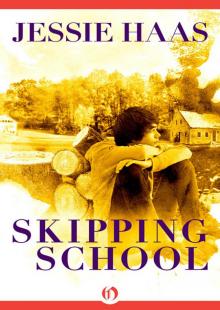 Skipping School
Skipping School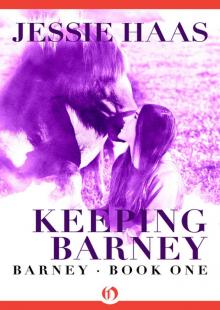 Keeping Barney
Keeping Barney Unbroken
Unbroken Westminster West
Westminster West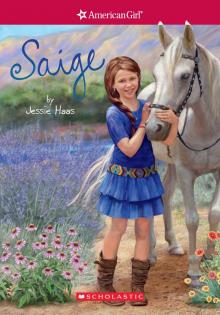 Saige
Saige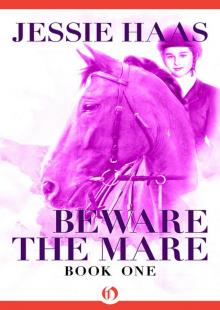 Beware the Mare
Beware the Mare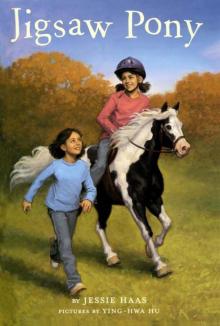 Jigsaw Pony
Jigsaw Pony Rescue
Rescue Saige Paints the Sky
Saige Paints the Sky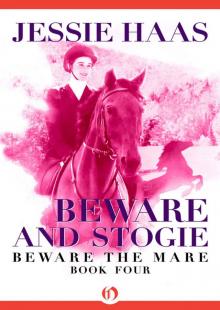 Beware and Stogie
Beware and Stogie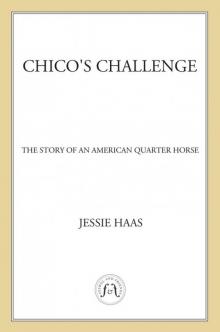 Chico's Challenge
Chico's Challenge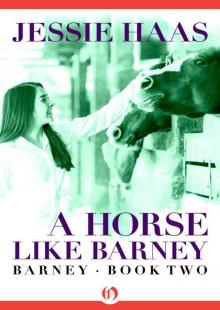 A Horse like Barney
A Horse like Barney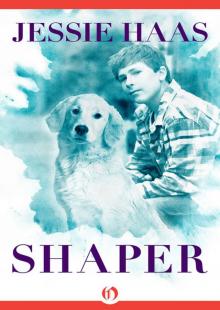 Shaper
Shaper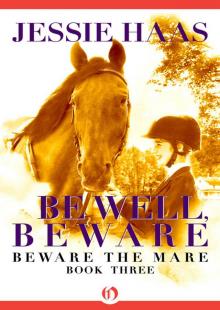 Be Well, Beware
Be Well, Beware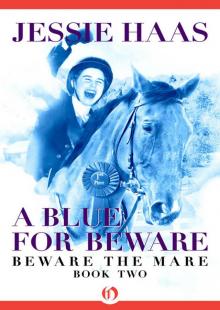 A Blue for Beware
A Blue for Beware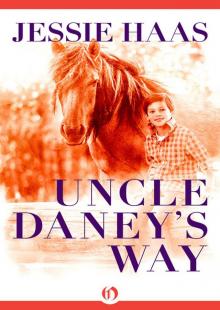 Uncle Daney's Way
Uncle Daney's Way